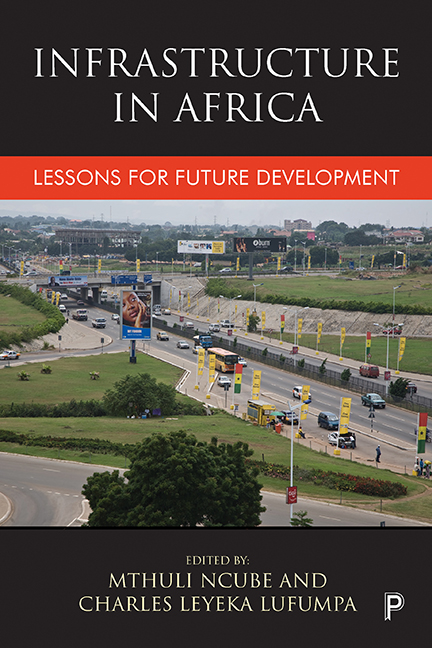Book contents
- Frontmatter
- Contents
- List of figures
- List of tables
- List of boxes
- Notes on contributors
- Acknowledgements
- Foreword
- Introduction: Infrastructure in African development
- Part 1 Spatial and demographic contexts
- Part 2 Sector-specific issues
- Part 3 Regional issues
- Part 4 Financing issues
- Part 5 Concluding remarks
- Index
Foreword
Published online by Cambridge University Press: 05 April 2022
- Frontmatter
- Contents
- List of figures
- List of tables
- List of boxes
- Notes on contributors
- Acknowledgements
- Foreword
- Introduction: Infrastructure in African development
- Part 1 Spatial and demographic contexts
- Part 2 Sector-specific issues
- Part 3 Regional issues
- Part 4 Financing issues
- Part 5 Concluding remarks
- Index
Summary
Africa has embarked on rethinking its strategies for sustainable growth building on the recent good growth performance of about 5% per annum. At the core of this mental shift is structural transformation. African economies have to evolve in their levels of development including the associated structure of factor endowments. However, each such structure requires corresponding infrastructure (both “hard” and “soft”) to circumscribe its operations and transactions.
It is now generally accepted that economic development is a continuum of change from a low-income agrarian economy to a highincome industrialized economy, not a dichotomy of two economic development levels (“poor” versus “rich” or “developing” versus “developed”). Because of historical and institutional specificities, infrastructure in African countries should not necessarily draw from infrastructure that exists in high-income countries but be fit for purpose given local realities and contexts. In essence, for any given growth/development trajectory, there is a basic mechanism for effective resource allocation. Development as a dynamic process demands “environmental” upgrading including improvements in “hard” and “soft” infrastructure at each stage. Such upgrading usually results in large externalities to firms’ transaction costs and returns to capital investment. For example, there are needs for an effective market mechanism just as much as for the government to actively define the institutional parameters for infrastructure improvements.
As a number of chapters in this book show, infrastructure generally provides the physical framework for a modern, healthy, and prosperous economy. For example, telecommunications, transportation, power and water, or public buildings including schools and hospitals define the way we live and relate to each other. Infrastructure is an integral aspect of society as it shapes how people communicate, access goods and services, and look at their quality of life through research, education, and commerce. Infrastructure does not only enable the transformation of individual ideas into action but also has a critical role in either exacerbating or reducing socioeconomic inequalities. In this regard, the quality of infrastructure is very important because it defines a society's development trajectory including elements of governance, economic planning and many aspects of domestic and foreign policy.
It is estimated that Africa needs around US$93 billion annually to finance its infrastructure gap.
- Type
- Chapter
- Information
- Infrastructure in AfricaLessons for Future Development, pp. xxxi - xxxivPublisher: Bristol University PressPrint publication year: 2017

